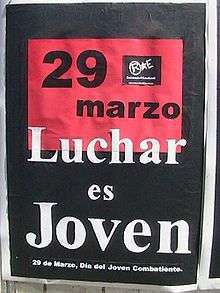Day of the Young Combatant
Day of the Young Combatant (Spanish: Día del joven combatiente) is a non-official commemoration day, celebrated each March 29 in Chile. Its main purpose is remembering the deaths of brothers Rafael and Eduardo Vergara Toledo, which occurred on March 29, 1985 during the dictatorship in Chile. The brothers were reportedly members of a pro-Marxist, anti-dictatorship insurgent group called MIR.
| Day of the Young Combatant | |
|---|---|
| Observed by | Chile |
| Date | March 29 |
| Next time | 29 March 2021 |
| Frequency | annual |

The commemoration is a call for human rights awareness and inquiry into several cases of extra judicial killings during the dictatorship. Violence often involves throwing rocks against buildings, vehicles, and police, as well as fire-bombing with Molotov cocktails. Given the general unrest-prone day, violence is directed not only against public and government buildings, but also against private property and commercial enterprises such as electrical wiring and power stations. These actions also serve as a cover-up for lootings and other deliberate criminal actions done by organized groups. Most of the violent protests are in the Villa Francia neighborhood, in Estación Central Commune of western Santiago, the place where the Vergara Toledo family resides. Whereas some commemorations in Chile involve peaceful marches, the Día del Joven Combatiente is well known to warrant violent action from hooded insurgents, this has caused local media to refer to the event as the Día del Joven Delincuente (Day of the Young Delinquent).[1][2][3]
Generally, local media and government agencies have disseminated warnings to the public to stay indoors, expect power outages (particularly near the mentioned neighborhood "Villa Francia") and several institutions such as Universities end classes early for students to return home before nightfall, which is mostly when the violent attacks happen. It is also common to expect public transportation to be sparse due to frequent attacks on public buses.
A similarly violent-prone and disruptive day is September 11, the day of the 1973 coup d'état.
References
- Agencia Informativa Orbe (March 30, 2007). "Ayer fue el Día del Joven Delincuente". Archived from the original on 2016-03-07.
- "Otra tragedia en el Día del Joven Delincuente". Las Últimas Noticias. March 30, 2015. Retrieved April 26, 2015.
- "El día del joven delincuente". La Tribuna. March 31, 2015. Retrieved April 26, 2015.